Lenovo Yoga Slim 7x review: OLED meets long battery life

 Image: IDG / Chris Hoffman
Image: IDG / Chris Hoffman At a glance
At a glance
Expert’s Rating
Pros
Amazing battery lifeBeautiful OLED screenGreat pricing on RAM and storage upgrades
Cons
No headphone jack or USB-A portWindows on Arm app compatibility isn’t perfect“Yoga” name is misleading as this isn’t a 2-in-1Copilot+ PC AI features are half-baked
Our Verdict
This Snapdragon X Elite-powered laptop combines a beautiful 14.5-inch OLED display with long battery life. But Snapdragon laptops without an OLED screen will get even longer battery life, and application compatibility still isn’t perfect on these new Arm PCs.
The Lenovo Yoga Slim 7x is one of the first Copilot+ PCs. While Microsoft is talking up AI features, the real story here is the Qualcomm Snapdragon X Elite hardware inside this PC. Microsoft has been releasing Arm-based Windows PCs since the Surface RT, but this is the first time that Arm-based Windows PCs have finally become seriously competitive.
Yes, this Snapdragon X Elite-powered 14.5-inch laptop delivers extremely long battery life with snappy performance and cool and quiet operation in day-to-day use. The experience with day-to-day productivity applications is beautiful – just like the OLED display this machine has. (Despite the “Yoga” name, however, this is not a 2-in-1 laptop).
Of course, the Windows on Arm experience isn’t perfect. Microsoft’s Prism translation software offers much improved compatibility with traditional x86 apps. Most existing x86 applications “just work,” but not everything “just works” at the moment. And, while gaming performance is decent thanks to both the Prism translation layer and the impressive integrated GPU, this can’t deliver as much graphical horsepower as a discrete Nvidia or AMD GPU in a more traditional gaming laptop.
Looking for more options? Check out PCWorld’s roundup of the best laptops available today.
Lenovo Yoga Slim 7x: Specs
The Lenovo Yoga Slim 7x is part of the first wave of Copilot+ PCs, and it includes an Arm-based Qualcomm Snapdragon X Elite chip. All Snapdragon X Elite chips include a neural processing unit (NPU) capable of 40 trillion operations per second (TOPS) as well as a Qualcomm Adreno GPU. This particular machine has Snapdragon X Elite X1E-78-100 hardware.
There are four Snapdragon X packages at launch, from lowest-end to highest-end:
The Snapdragon X Plus X1P-64-100 avoids the “Elite” name and only has 10 cores.The Snapdragon X Elite X1E-78-100 in this machine includes 12 cores.The Snapdragon X Elite X1E-80-100 has 12 cores as well, but it gains a “Dual Core Boost” feature that can go up to 4.0 GHz for extra power when the CPU needs it.The Snapdragon X Elite X1E-84-100 has 12 cores, but its Dual Core boost goes up to 4.2 GHz. It also offers faster multi-threaded CPU performance and a high-performance Qualcomm Adreno GPU.
It’s unclear how much the differences between these chips will matter in the real world until we see more reviews and have a chance to benchmark more laptops with the different models ourselves.
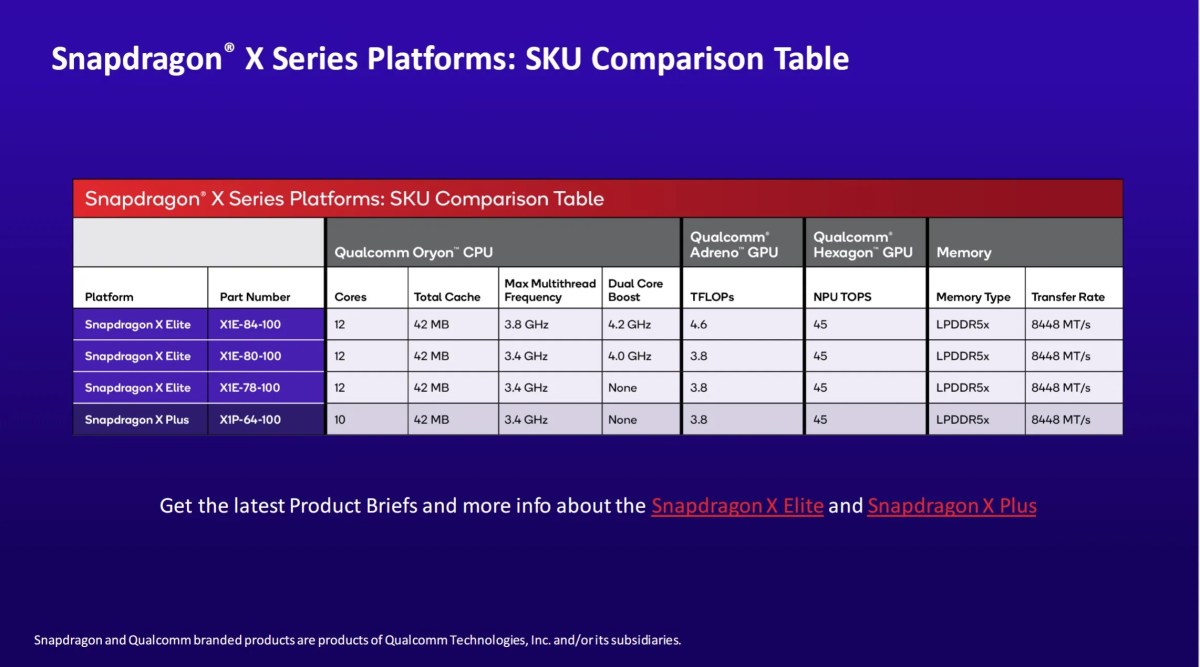
Qualcomm
Qualcomm
Qualcomm
There aren’t a lot of other hardware options when configuring this $1,199 machine. Our review model came with 16 GB of LPDDR5X-8448MHz RAM, but you can get this machine with 32 GB of RAM for an extra $69. Like many modern PCs, the RAM is soldered. You have to make your decision when buying the machine — you can’t upgrade it later.
Additionally, our system included a 512 GB PCIe Gen4 SSD for storage. You can upgrade to a 1 TB SSD for an extra $45. Those are very reasonable prices for the upgrades. At that price, I’d recommend it.
This machine has a neural processing unit (NPU) that can deliver 45 TOPS (trillion operations per second) of performance. That means it gets access to a variety of Copilot+ PC AI features. Unfortunately, with the splashy and controversial Recall feature delayed, the AI features on Copilot+ PCs aren’t particularly compelling at launch. They may become compelling in the future, especially when Recall launches, or if third-party application developers start using the NPU to power AI features in their Windows applications.
CPU: Qualcomm Snapdragon X Elite X1E-78-100Memory: 16 GB LPDDR5X-8448MHzGraphics/GPU: Qualcomm AdrenoDisplay: 2944×1840 OLED with 90Hz refresh rate and touch screenStorage: 512GB PCIe Gen4 SSDWebcam: 1080p camera with shutter switchConnectivity: 3x USB-C Full-Function ports (USB4 Gen 3, Power Delivery 3.1, DisplayPort 1.4)Networking: Wi-Fi 7, Bluetooth 5.3 (with Bluetooth 5.4 capable hardware)Biometrics: IR camera for Windows HelloBattery capacity: 70 Watt-hoursDimensions: 12.8 x 8.86 x 0.51 inchesWeight: 2.82 poundsMSRP: $1,199 as tested
Lenovo Yoga Slim 7x: Design and build quality
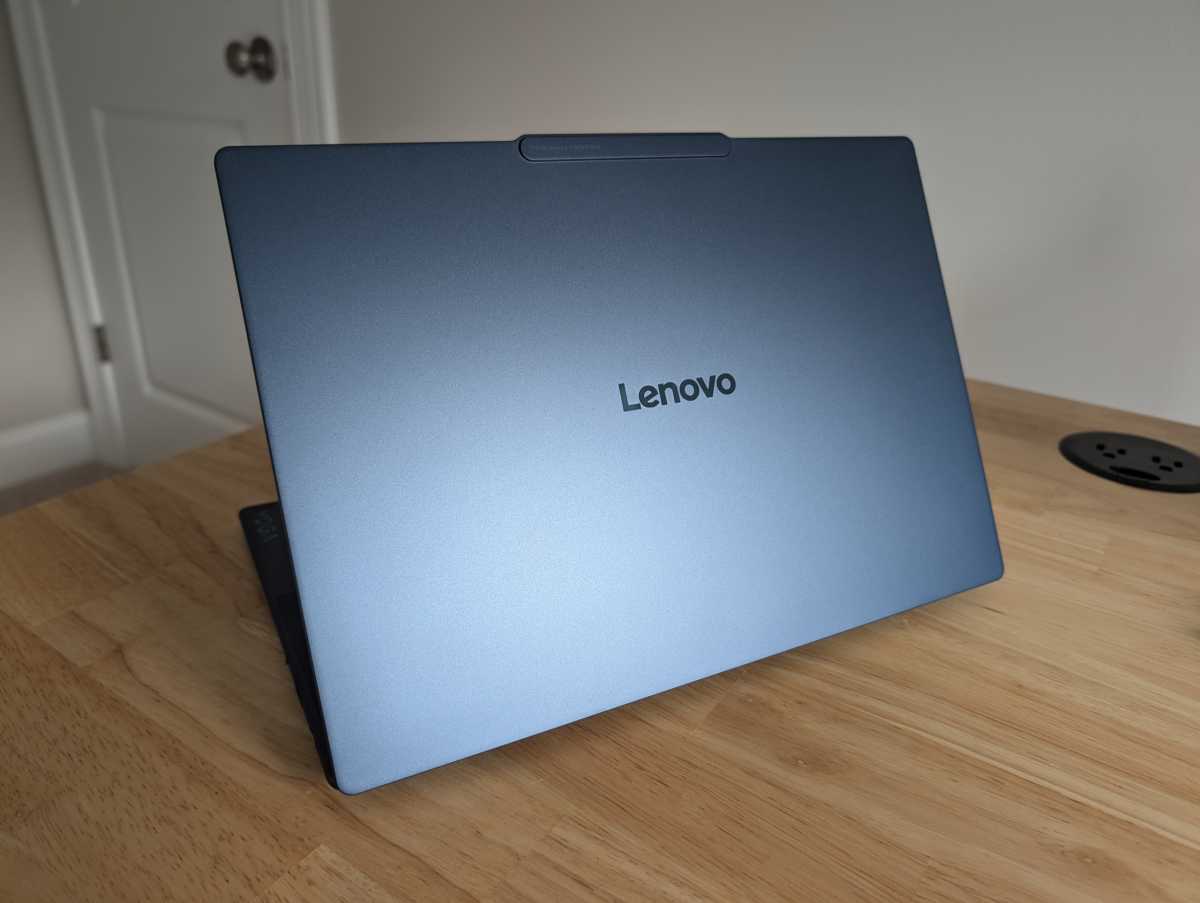
IDG / Chris Hoffman
IDG / Chris Hoffman
IDG / Chris Hoffman
While there are transformational changes under the hood, Lenovo didn’t reinvent the wheel with the Lenovo Slim 7x’s design. The chassis is a spitting image of the Lenovo Slim 7 14 we reviewed just a few months ago.
Like that laptop, this machine is made of aluminum and has a nice smooth metallic finish with lots of rounded edges and a small bezel around the display. Lenovo calls this laptop’s color scheme “Cosmic Blue.” It’s a nice, dark, professional-looking metallic finish. It has the “communications bar” at the top of the laptop’s display. That bar gives the webcam and IR camera a place to live, letting Lenovo shrink the bezel around the screen – and giving you a convenient handhold when opening the laptop.
While this machine bears the “Yoga” name, it doesn’t have a 360-degree hinge. This laptop does have a touch screen, but it’s not a convertible “2 in 1.” In fact, the screen doesn’t even lie flat. That’s fine, but I do think it’s a little confusing considering what the Yoga name has meant in the past. I showed this machine to another person who expected it to be a 2-in-1 thanks to the “Yoga” name. Lenovo says that it’s moving forward with using the “Yoga” name for more laptops in the US and that it’s already been using the name in this way internationally. Once again, that’s fine – just don’t be misled by the name.
At 2.82 pounds, this is a nice light laptop. The build quality feels nice and premium – the laptop is solid and doesn’t flex in any strange ways. The hinge action feels great. Lenovo says this “durable aluminum design” is tested to MIL-STD 810H military-grade standards, and it feels solid and sturdy while remaining lightweight.
Software-wise, this is a familiar Lenovo laptop experience. Bloatware is very restrained, but Lenovo does install a trial of McAfee antivirus, which will show you popups with a “welcome offer.”
Unlike Microsoft’s Surface Laptop, however, which omits the stickers below the keyboard, Lenovo chose to stick a variety of stickers to the left of the touchpad. It would be nice to see manufacturers move on from those stickers, but maybe we’ll be stuck with them going forward.
Lenovo Yoga Slim 7x: Keyboard and trackpad
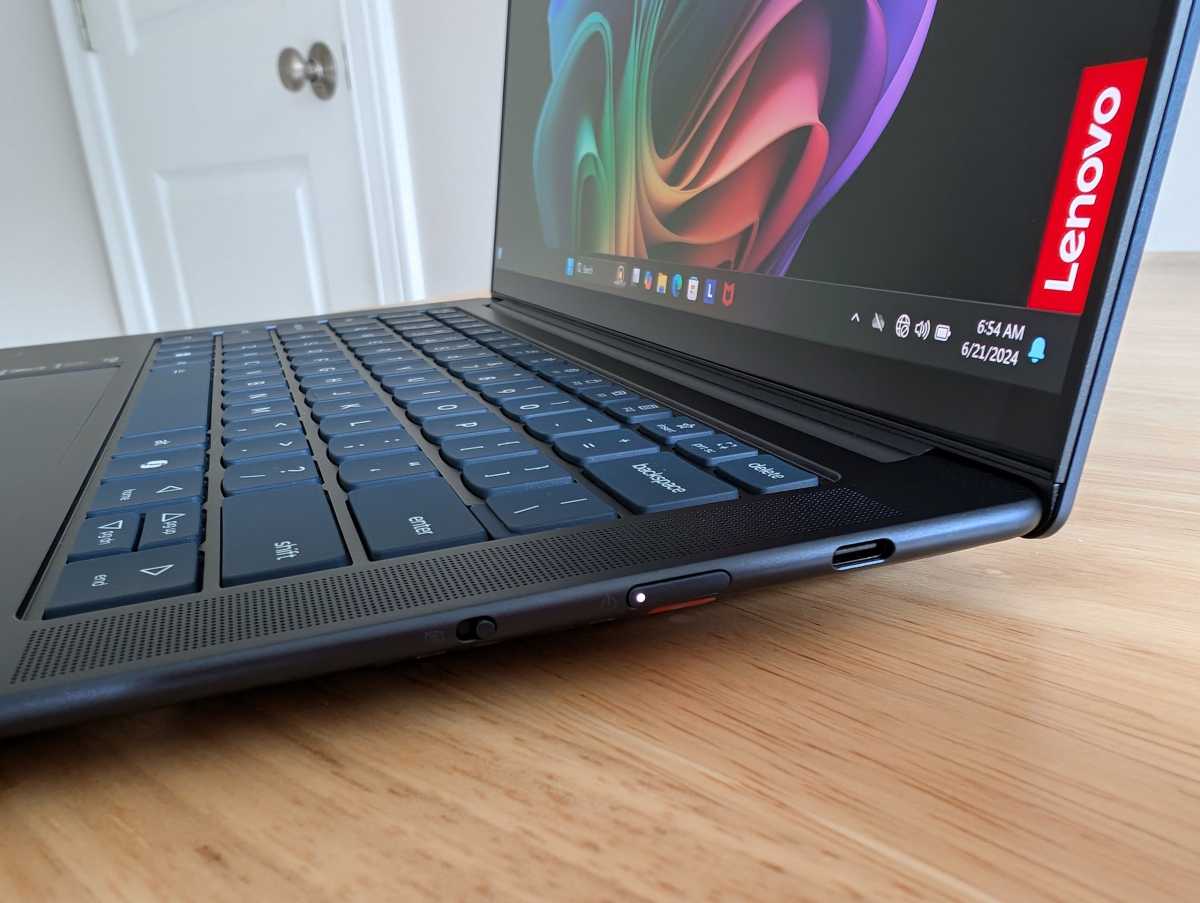
IDG / Chris Hoffman
IDG / Chris Hoffman
IDG / Chris Hoffman
The Lenovo Yoga Slim 7x’s keyboard feels very nice to type on. The specs sheet says it has 1.5mm of key travel, which is nice for a laptop – especially one this thin. With plenty of travel, the keys are enjoyable to type on. They’re pleasantly snappy. This is no surprise as we spoke positively about this keyboard in our Lenovo Slim 7 14 review, too. The keyboard also has a nice white backlight.
The touchpad here is good. It’s a fairly standard touchpad with a reasonable size, accurate tracking, a good click, and solid palm rejection. These days, a standard touchpad on a PC laptop is pretty good. Lenovo hasn’t gone above and beyond the average ultrabook when it comes to the touchpad – but that makes sense, as this is a pretty good price. In addition to the touchpad, this machine also has a touch screen.
Lenovo Yoga Slim 7x: Display and speakers
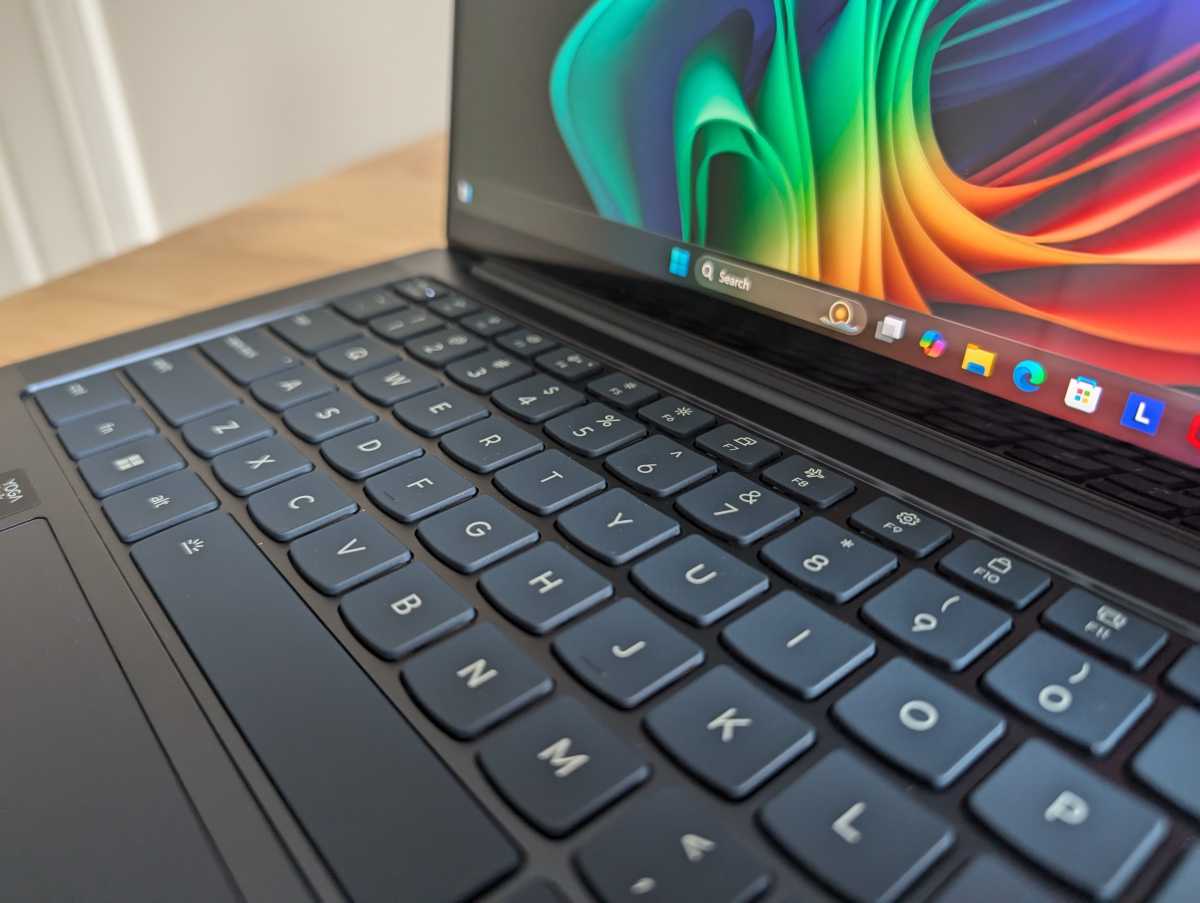
IDG / Chris Hoffman
IDG / Chris Hoffman
IDG / Chris Hoffman
The Lenovo Yoga Slim 7x’s display is the star here. Lenovo included a 14.5-inch 2944×1840 OLED display with a 16:10 aspect ratio, 90Hz refresh rate, and a touch screen. It’s a bright, beautiful display. An OLED display means deep dark blacks and vivid colors, and you’re getting that here.
Really, it bears repeating: That display is one of the big reasons you’d pick this machine out of the first Copilot+ PC lineup. Microsoft’s Surface Laptop isn’t available with an OLED display, so you have to go for a Surface Pro tablet or a laptop from another manufacturer.
In our review of the Intel Core Ultra-powered Lenovo Slim 7 14 from earlier this year, we noted that its 1920×1200 OLED display was a step behind the competition. The upgraded display is awesome. And, thanks to the Snapdragon X Elite hardware here, Lenovo managed to deliver a higher-resolution OLED display and longer battery life versus than the Intel-powered Lenovo Slim 7 14.
The OLED display is a little on the glossy side and can pick up reflections, as you’ll notice in some of the photos in this review. But it’s bright enough that it was plenty readable even in the direct sunlight outdoors, which is a worst-case scenario for any laptop.
The speakers here are similar to that Intel-powered model. There are upward-firing speakers on each side of the keyboard. In our review of the Slim 7 14, we said that the speakers were typical for a laptop of this size and price range, saying that they “provide acceptable audio with good volume and clarity, but they lack the depth and complexity available in Lenovo’s more expensive laptops and 2-in-1s.” That’s a spot-on description of this laptop’s speakers, too.
Lenovo Yoga Slim 7x: Webcam, microphone, biometrics
The Lenovo Yoga Slim 7x includes a 1080p webcam, which is on the “communications bar” that juts out a tiny bit above the display. It’s a nice webcam, and the quality seems a touch better than some other 1080p webcams I’ve used recently. It’ll be great for video meetings.
This machine has a physical webcam switch on its right side. Flip the switch and the webcam will be cut off. You might prefer a physical shutter that covers the laptop’s webcam if you’re a fan of webcam privacy tricks, but that’s often a more expensive feature for higher-end business laptops.
This machine has an IR camera for Windows Hello logins. It works very well: You can open your laptop, and it sees your face and signs you in. But this machine goes beyond that with an interesting presence sensor. If you activate the presence sensor, it will notice when you get up and walk away from your laptop, locking the laptop – which is great for both security and battery life. And, when you sit down in front of the laptop, the presence sensor will activate the laptop and sign you back in with Windows Hello. It’s a nice feature, and it’s something Microsoft’s Surface Laptop doesn’t offer.
Lenovo Yoga Slim 7x: Connectivity
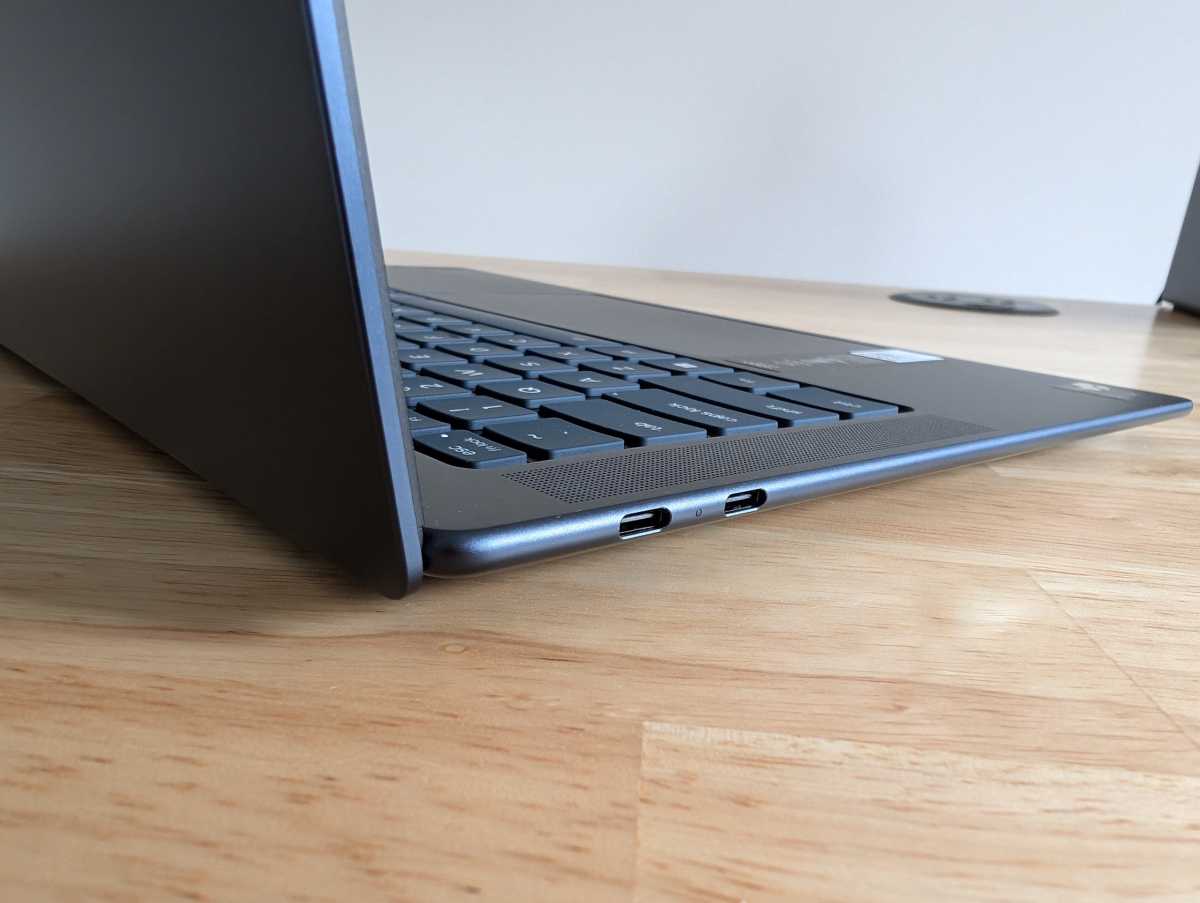
IDG / Chris Hoffman
IDG / Chris Hoffman
IDG / Chris Hoffman
The Lenovo Yoga Slim 7x’s selection of ports feels simultaneously generous and skimpy.
If you’re looking for USB-C ports, it’s generous: You’re getting three USB-C ports, two on the left side of the laptop and one on the right side. They’re all “USB-C Full-Function ports” with USB4 Gen 3, Power Delivery 3.1, and DisplayPort 1.4. You will have to plug the charger into one of them to charge this machine, but you still have two USB-C ports to play with while it’s charging before you even have to think about a dongle.
That’s it, though. There are no other ports here: Not even a traditional audio jack or single USB-A port, and certainly not a microSD card reader or an HDMI port.
That’s fine if you’re willing to go all-in on USB-C! But it’s worth noting that some of these Snapdragon X Elite-powered Copilot+ laptops do offer more ports, so you do have the option of getting them along with this new Arm hardware. Asus’s larger Asus Vivobook S 15, for example, includes USB Type-A, an audio jack, HDMI out, and a microSD card reader.
The Lenovo Yoga Slim 7x includes Wi-Fi 7 support along with Bluetooth 5.4-capable hardware. The laptop’s Wi-Fi performed well, although I don’t have a Wi-Fi 7 network to test the latest standard on yet.
Lenovo lists Bluetooth 5.3 on this laptop’s spec sheet, but a Lenovo representative tells me that the company is a little conservative – other companies may list Bluetooth 5.4 as the hardware is capable of it, even though Windows doesn’t yet deliver it. Rest assured this laptop has just as much Bluetooth 5.4 capability as any other Snapdragon X Elite-powered laptop.
What about application compatibility?
Windows on Arm’s application compatibility is now very good — but not perfect. Remember: We’re talking about a major architectural shift for Windows here. These Snapdragon X Elite-powered laptops are Windows on Arm PCs that can run traditional x86 Windows applications through a Prism translation layer.
For the most part, applications “just work” — either because they have a native Arm version already available or because the x86 version runs through Prism. If it does “just work,” you don’t have to think about it.
But not everything works. Some applications will show errors and refuse to install. For example, the official Google Drive sync tool doesn’t work on these machines. It has to integrate with File Explorer, and it can’t do that through the Prism translation layer. Google hasn’t ported it to Windows on Arm yet.
Applications that need low-level access will be a problem in general. If you have a very old printer lying around that needs a manufacturer printer driver, for example, that traditional printer driver was likely created only for x86 versions of Windows. It likely won’t work on an Arm-powered laptop.
While PC gaming has been a focus of Qualcomm’s marketing, Microsoft says productivity applications will work better than PC games. The Windows on Arm Ready Software website attempts to catalog PC game compatibility, and it notes that Fortnite doesn’t run at all on these machines thanks to anti-cheat support. That’s just one example: Wide game compatibility isn’t here yet.
Lenovo Yoga Slim 7x: Performance
The Lenovo Yoga Slim 7x delivered very snappy day-to-day performance while running on battery power in typical desktop applications, including web browsers like Edge, Chrome, and Firefox, as well as popular productivity applications like the Microsoft Office suite and Slack. While this laptop has fans for active cooling, it stayed cool and quiet in normal use.
The Lenovo Yoga Slim 7x is a great laptop for day-to-day use with typical desktop applications.
We ran the Lenovo Yoga Slim 7x through our standard benchmarks to see how it performs.
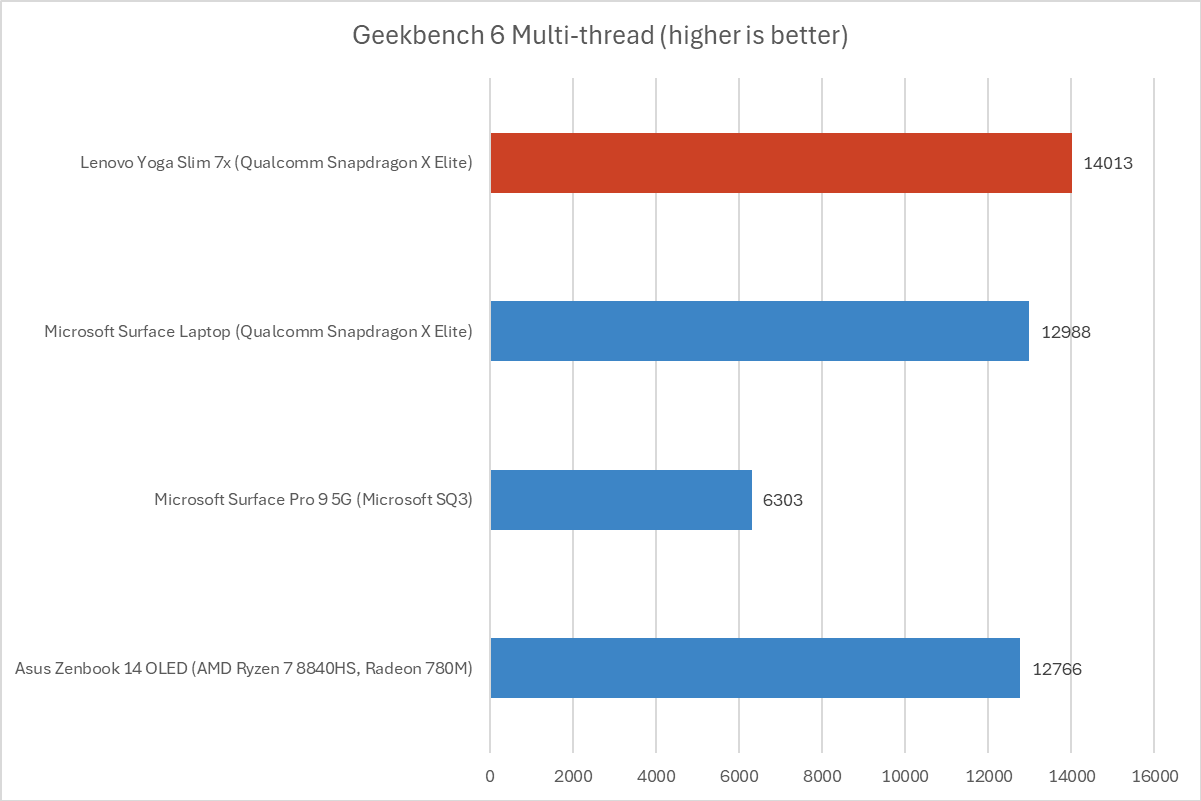
IDG / Chris Hoffman
IDG / Chris Hoffman
IDG / Chris Hoffman
First, we ran a CPU benchmark with Geekbench 6. We normally run PCMark 10, but it doesn’t run on Arm computers like this one. Geekbench 6 runs natively on ARM, so we can get an idea of this machine’s CPU performance when running native Arm code without Microsoft’s Prism translation layer involved.
The Lenovo Yoga Slim 7x delivered an excellent score of 14013 in the multi-threaded CPU benchmark, beating both the Snapdragon X Elite-powered Microsoft Surface laptop and the Asus Zenbook 14 OLED with its Ryzen hardware. You can see the huge improvement from the older Arm-based Microsoft SQ3 processors in the Microsoft Surface Pro 9.
The fans stayed nice and quiet while this benchmark was running.
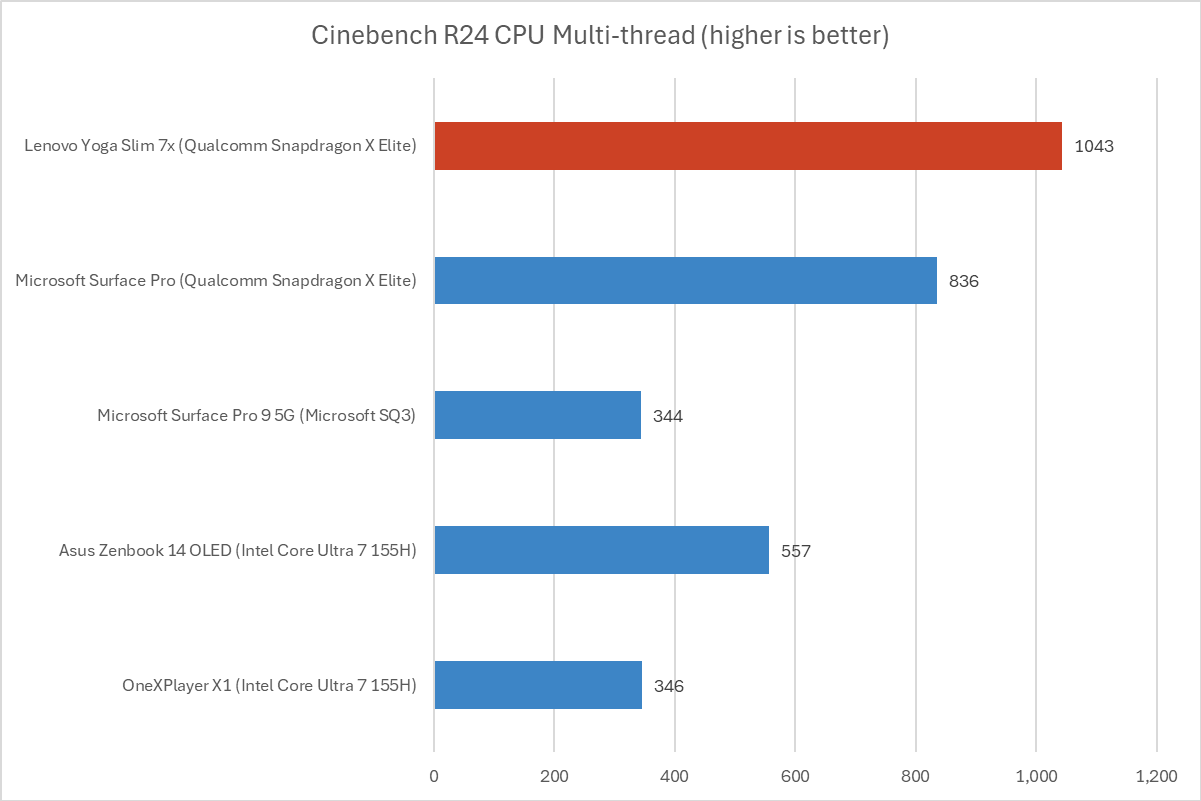
IDG / Chris Hoffman
IDG / Chris Hoffman
IDG / Chris Hoffman
Next, we run Cinebench R24. Cinebench R24 has a native Arm version, which means it isn’t running through the Prism translation layer. This is a heavily multithreaded benchmark that focuses on overall CPU performance. It’s a quick benchmark, so cooling under extended workloads isn’t a factor. But, since it’s heavily multithreaded, CPUs with more cores have a huge advantage.
The Lenovo Yoga Slim 7x delivered a score of 1023 in the multi-threaded benchmark, beating all the older machines we compared it to. It’s faster than recent Intel Meteor Lake CPUs here — in fact, it’s even noticeably faster than Microsoft’s Surface Pro 2-in-1.
The fans spun up while this multi-threaded benchmark was running — they kick in to provide extra cooling for intensive workloads like this one. (I didn’t notice them running much at all during day-to-day application use.) While Snapdragon X Elite laptops deliver cool and quiet operation in day-to-day use, they will run hotter and louder while performing CPU-intensive tasks.
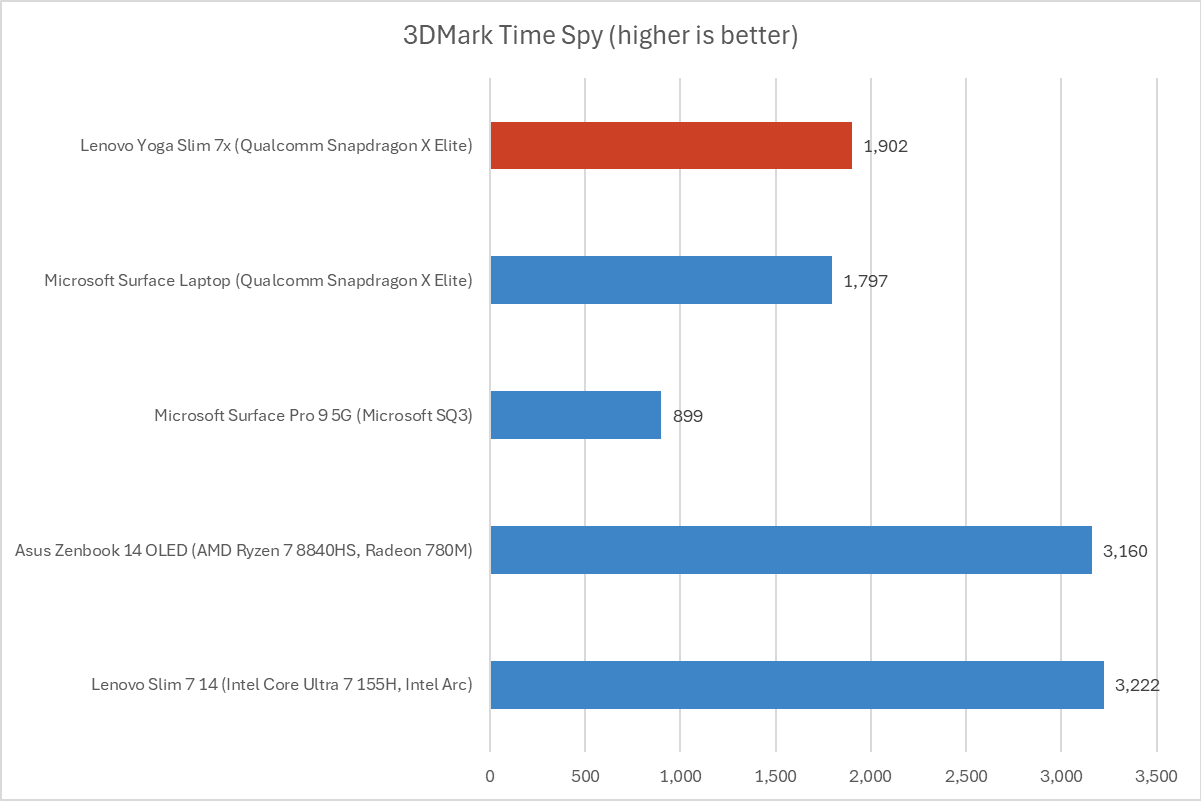
IDG / Chris Hoffman
IDG / Chris Hoffman
IDG / Chris Hoffman
Next, we run a graphical benchmark. Despite Qualcomm talking a lot about gaming performance, this isn’t really a gaming laptop. It’s a laptop that can run some games in a pinch, but Microsoft says compatibility will be better with productivity applications than games. As always, we run 3DMark Time Spy, a graphical benchmark that focuses on GPU performance. We also run 3DMark Night Raid.
Time Spy is running through the Prism translation layer, while Night Raid is running natively on Arm. The pair of results shows the difference between x86 code translated with Prism and native Arm code.
The Yoga Slim 7x delivered a score of 1902 in the Time Spy benchmark. That’s faster than the Surface Laptop, once again. It’s noticeably slower than recent Intel and AMD chips. While Qualcomm is talking up gaming performance of existing PC games that haven’t been ported to ARM, one of the tricks it depends on is Auto Super Resolution, which uses the NPU to upgrade the image. That trick isn’t available to this laptop in this benchmark.
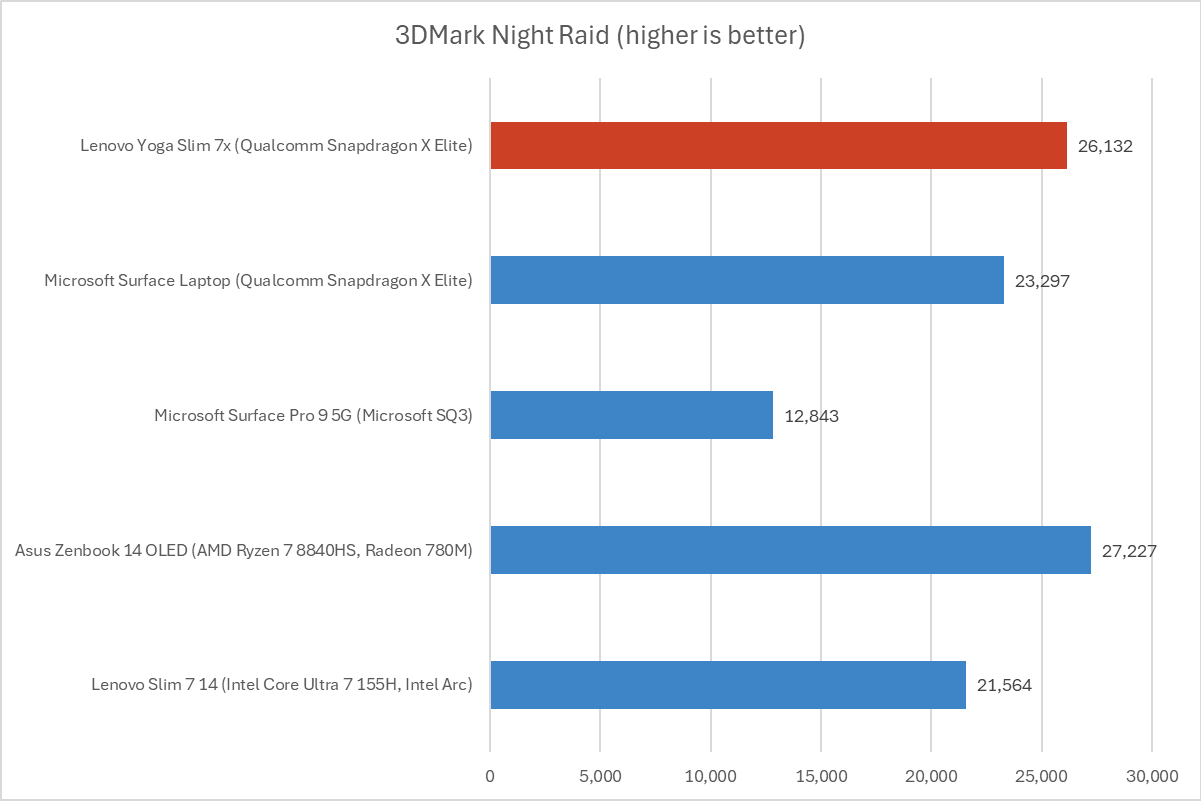
IDG / Chris Hoffman
IDG / Chris Hoffman
IDG / Chris Hoffman
When we ran the Night Raid benchmark, which runs natively on Arm, the Qualcomm Adreno GPU shot past the Intel Arc graphics in the Lenovo Slim 7 14, coming a close second to the AMD Radeon 780M graphics. While Prism works well, it’s clear these machines will perform best when running native Arm code.
While these graphical benchmarks hit the Yoga Slim 7x’s Qualcomm Adreno GPU hard, the laptop’s fans weren’t especially loud while they were running. The GPU can deliver its performance without a lot of noise or heat.
Overall, the performance was impressive. It’s exactly what I’d hoped to see: Nice snappy performance in desktop applications with competitive performance in traditional x86 applications running through the Prism translation layer. This machine also delivered slightly better performance than the Surface Laptop and Surface Pro across our benchmarks.
However, despite all the hype about gaming performance, I wouldn’t buy a Snapdragon X Elite with gaming in mind. Not all games run — and I was surprised to see that even Microsoft’s own Game Pass service for PCs won’t let you install PC games on these computers. It only offers the ability to stream Xbox games from the cloud. If these machines are great at running games, Microsoft’s Xbox team certainly hasn’t gotten the message yet.
For now, you’ll want a more traditional gaming laptop for maximum compatibility and maximum performance.
Lenovo Yoga Slim 7x: Battery life
The entire industry has been talking up the battery life of these Snapdragon X Elite-powered laptops. Lenovo says the Yoga Slim 7x has “multiday battery life,” which the company describes as two 8-hour workdays of mixed workloads. Additionally, Lenovo says this machine has “Rapid Charge Express” technology and can get up to 3 hours of runtime in 15 minutes of charging time, and it seemed to charge nice and fast.
With a battery-sipping Snapdragon X Elite chip and a 70 Watt-hour battery, it should get pretty good battery life. We saw incredible battery life for a laptop with an OLED screen, although it’s not as much battery life as Microsoft’s Surface Laptop with its more energy-efficient display.
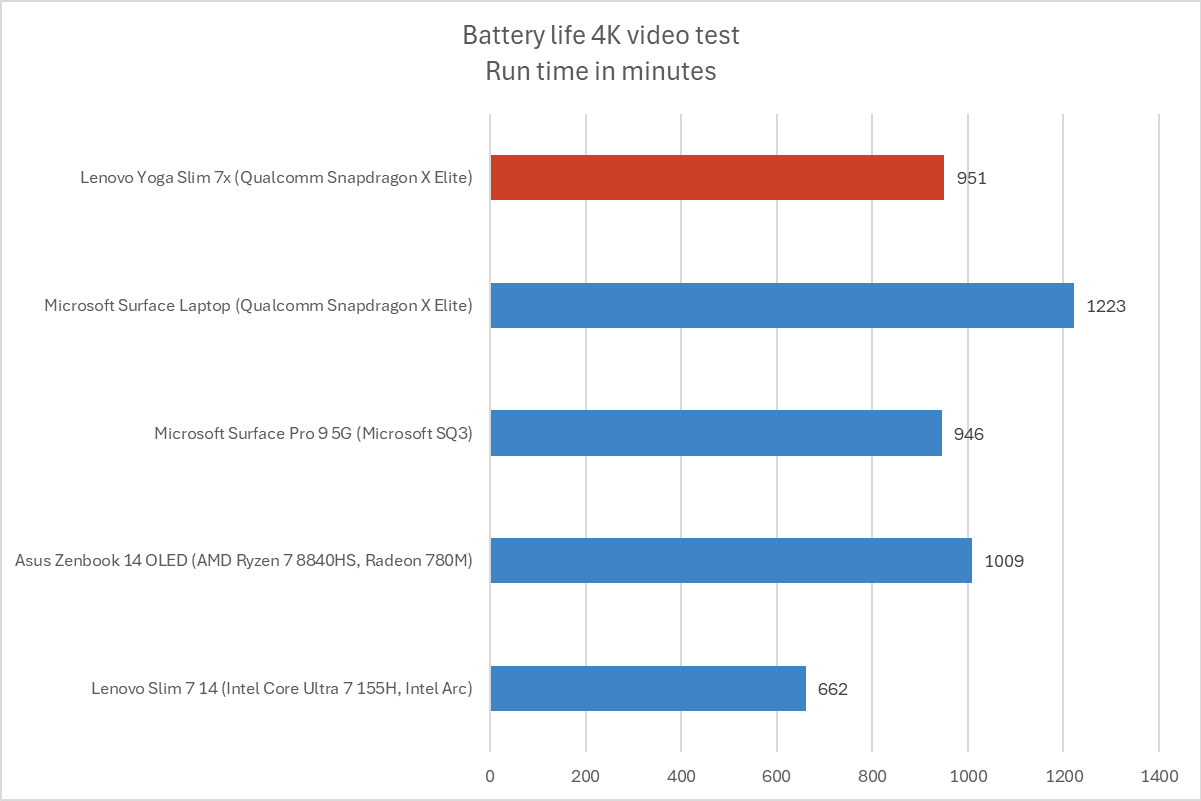
IDG / Chris Hoffman
IDG / Chris Hoffman
IDG / Chris Hoffman
To benchmark the battery life, we play a 4K copy of Tears of Steel on repeat in the Media Player app on Windows 11 with airplane mode enabled until the laptop suspends itself. We set the screen to 250 nits of brightness for our battery benchmarks, and it’s worth noting that OLED laptops have a bit of an advantage, as OLED screens use less power to display the black bars around the video. This is a best-case scenario for any laptop since local video playback is so efficient, and real battery life in day-to-day use is always going to be less than this.
The Lenovo Yoga Slim 7x lasted for an average of 951 minutes, which is a tad under 16 hours. That’s a truly incredible number for a laptop with an OLED display. In real use, too, the laptop delivered snappy performance in day-to-day computer usage — applications like Chrome, Edge, video meetings, Microsoft Office, and Slack — while the battery level dropped much slower than it would on the typical Intel or AMD laptop I’ve been reviewing.
Of course, that 14.5-inch OLED display is draining the battery a bit faster. Microsoft’s Surface Laptop beat this laptop in our benchmarks with an extra four hours of battery life — all while having a smaller 54 Watt-hour battery. If you’re looking for the longest possible battery life, you’ll likely want to look elsewhere. But you’ll be getting a less vibrant display. The trade-off is up to you — but, with battery life this good, sacrificing a little bit of it for a more beautiful OLED display feels like a reasonable move.
Lenovo Yoga Slim 7x: Conclusion
The Lenovo Yoga Slim 7x is a great laptop for day-to-day use with typical desktop applications. It offers nice, snappy performance even on battery power. Thanks to the incredible energy efficiency of the Snapdragon X Elite hardware and the reasonably large 70 Watt-hour battery in this machine, this PC gets great battery life – even though it has a high-resolution OLED display.
If you’re interested in this machine, you’re likely in one of two situations:
First, you may be curious about Snapdragon X Elite PCs in general. If so, you should probably do some research to see whether the applications you depend on run on Snapdragon X Elite PCs in general. The lack of Google Drive will be a big deal for some people — and that’s just one example. PC game compatibility isn’t perfect, either. Intel’s Lunar Lake may deliver an experience more like this one with full x86 compatibility later this year. But, if the applications you do rely on work on this hardware and you’re interested in the excellent day-to-day performance with long battery life without waiting to see Intel’s next hardware release, I think you’ll be happy with one.
Second, you might be comparing the various Snapdragon X Elite Copilot+ PCs available now. Compared to a Surface Laptop, for example, this machine trades some of that battery life for a big and beautiful OLED display. And it offers a good deal if you want more RAM and storage, too. If maximum battery life is all that’s important to you, look elsewhere — like the Surface Laptop. If you want more ports (like a USB-A port, HDMI port, or headphone jack, this also isn’t the machine for you.
Ultimately, the Lenovo Yoga Slim 7x is a beautiful machine. Its main problems are with software: Windows on Arm still doesn’t have perfect software compatibility, and these Copilot+ PC AI features aren’t all they’re hyped up to be at launch. But I can’t help but love this kind of performance and battery life combined with a vivid OLED display.
Author: Chris Hoffman, Contributor

Chris Hoffman is the author of Windows Intelligence, a free email newsletter that brings the latest Windows PC news, trips, and tricks to inboxes each week. He’s also the former editor-in-chief of How-To Geek and a veteran tech journalist whose work has appeared in The New York Times, PCMag, Reader’s Digest, and other publications.
Recent stories by Chris Hoffman:
Dell Inspiron 16 Plus review: A well-rounded content creation laptopYawn. Windows’ Copilot+ AI features feel like early tech demos at bestLenovo ThinkPad X1 2-in-1 review: A ThinkPad with a pen






